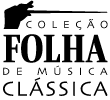|
Johannes Brahms
Obras
Colaboração para a Folha Online
SINFONIAS:
No.1 em C menor (1855-76);
No.2 em D maior (1877);
No.3 em F maior (1883);
No.4 em E menor (884-45).
CONCERTOS:
Concerto para piano No.1 em D menor (1854-58);
Concerto para piano No.2 em Bb maior (1878-81);
Concerto para violino em D maior (1878);
Concerto para violino e violoncello em A menor (1887).
MÚSICA DE CÂMARA:
Sexteto de Cordas No.1 (1858-60),
Sexteto de Cordas No.2 in G major, Op.36 (1864-5);
Quarteto de Cordas No.1 e No.2 (1859-1873),
Quarteto de Cordas No.3 (1876);
Quinteto de Cordas No.1 (1882),
Quinteto de Cordas No.2 (1890);
Quinteto de clarineta (1891);
Quarteto de Pianoforte No.1 (1861),
Quarteto de Pianoforte No.2 (1861-62),
Quarteto de Pianoforte No.3 (1855-75);
Quinteto de Pianoforte (1864);
Trio de Pianoforte No.1 (1853-54),
Trio de Pianoforte No.2 (1880-82),
Trio de Pianoforte No.3 (1886);
Violoncelo sonata No.1 (1862-5),
Violoncelo sonata No.2 (1886);
violino sonata, No.1 (1878-79),
violino sonata No.2 (1886),
violino sonata No.3 (1886-88);
Scherzo in C minor, vn., pf. (1853).
ORQUESTRA:
Serenades, No.1 em D (1857-58),
Serenades, No.2 em A (1858-59);
3 Hungarian Dances (1873);
Variations on a Theme by Haydn (1873);
Akademische Festouvertüre (Academic Festival Overture) (1880);
Tragic Ov., (1880).
CORO E ORQUESTRA.:
Ein Deutsches Requiem (1857-68);
Rinaldo (1863-68);
Rhapsody (1869);
Schicksalslied (1871);
Triumphlied (1870-71);
Nänie (1880-81);
Gesang der Parzen (1882).
PIANO:
sonata No.1 em C maior (1852-53),
sonata No.2 em F# menor (1852),
sonata No.3 em F menor (1853);
Scherzo em Eb menor (1851);
Variations on a Theme by R. Schumann, em F# menor (1854);
4 Ballades (No.1 em D menor, No.2 em D, No.3 em B menor, No.4 em B) (1854);
Variations on a Theme by R. Schumann (1861);
Variations and Fugue on a Theme by Handel (1861);
Hungarian Dances (1852-69);
Variations on a Theme by Paganini (1862-63);
16 Waltzes (1865);
Variations on a Theme by Haydn (1873);
Liebesliederwalzer (1868-9);
Neue Liebesliederwalzer (1874);
ÓRGÃO:
11 Choral Preludes (1896);
Fugue em A menor (1856);
Prelude and Fugue em A menor (1856);
Prelude and Fugue em G menor (1857).
CANÇÕES (MAIS IMPORTANTES):
Abend-dämmerung (Schack) No.5 (1868);
Am Sonntag Morgen (Heyse) No.1 (1868);
An eine Aeolsharfe (Mörike) No.5 (1859);
Auf dem Kirchhofe (Liliencron) No.4 (1886);
Blinde Kuh (Kopisch) No.1 (1871);
Botschaft (Daumer) No.1 (c.1860);
Dein blaues Auge (Groth) No.8 (1873);
Es liebt sich so lieblich (Heine) No.1 (1877);
Feldeinsamkeit (Allmers) No.2 (1877-78);
Geistliches Wiegenlied (Geibel) No.2 (1884);
Gestillte Sehnsucht (Rückert) No.1 (1884);
Immer leise (Ling) No.2 (1886);
Der Jäger (Halm) No.4 (1884);
Kein Haus, keine Heimat (Halm) No.5 (1884);
Komm bald (Groth) No.5 (1884);
Der Kranz (Schmidt) No.2 (1881);
Lerchengesang (Candidus) No.2 (1877);
Liebestreu (Reinick) No.1 (1853);
Das Mädchen spricht (Gruppe) No.3 (1886);
Die Mainacht (Hölty) No.2 (1868);
Mein Herz ist schwer (Geibel) No.3 (1884);
Mit vierzig Jahren (Rückert) No.1 (1884);
Die Nachtigall (Reinhold) No.1 (1884);
Nachtigallen schwingen (Fallersleben) No.6 (1853);
O kühler Wald (Brentano) No.3 (1876-77);
Salome (Keller) No.8 (1877);
Sapphische Ode (Schmidt) No.4 (1884);
Sonntag (Uhland) No.3 (c.1865);
Ständchen (Kugler) No.1 (1886);
Steig auf, geliebter Schatten (Halm) No.2 (1884);
Therese (Keller) No.1 (1877);
Vergebliches Ständchen (trad.) No.4 (1881);
Verzagen (Lemcke) No.4 (1877).
|



